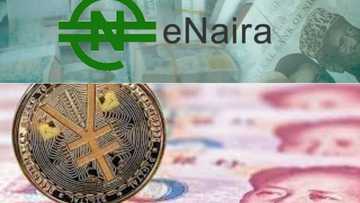IMF Raises the Alarm eNaira May Lead to Money Laundering, Terrorism Financing Risks
- The International Monetary Fund (IMF) has said the recently launched eNaira is fraught with the risks of money laundering and terrorism financing
- The IMF opined that the risks associated with the release of the eNaira are such that the Central Bank of Nigeria needs to tighten security around it
- The global fund commended the CBN for being one of the first in the world to roll out digital currency
PAY ATTENTION: Click “See First” under the “Following” tab to see Legit.ng News on your Facebook News Feed!
Just a few days after the International Monetary Fund (IMF) said it is not sure the eNaira and other CBDCs will survive, it has again sounded the alarm that Nigeria's nascent digital currency faces the risks of being used for money laundering and terrorism financing by cybercriminals.
The IMF said cybercriminals can take advantage of existing loopholes in the eNaira to launder money across the border and finance terrorism as Nigeria battles insurgency and terrorism in parts of the country.

Read also
IMF warns CBN eNaira is not good enough for cross border transactions, lists work that needs to be done first

Source: UGC
The IMF disclosed this in its Nigeria Staff Report for 2021 Article IV Consultation.
eNaira faces cyber-security risks
As per the report, with the launching of the digital currency on October 25. Nigeria became one of the first countries in the world to introduce a Central Bank Digital Currency (CBDC) that is open to the public.
PAY ATTENTION: Join Legit.ng Telegram channel! Never miss important updates!
Apart from the advantages of enhancing financial inclusion, there are some risks around the eNaira that Nigeria’s Central Bank needs to tackle.
According to a report by Nairametrics, the IMF is impressed with the gradual rollout of the CBDC and stressed the need for alertness to various risks that include monetary policy implementation, bank funding, cyber security, operational resilience, financial integrity and stability.
What the IMF is saying about the eNaira
The IMF said:
“Prospective expansion of eNaira use to cross-border fund transfers and agency bank networks may cause new money-laundering/financing of terrorism risks.”
However, the IMF has said that the CBDC is exposed to cyber security risks, unexpected legal issues and financial integrity risks.
As per the IMF's report, there are cyber security risks associated with the eNaira which can be exploited by unscrupulous people. Not seen-before legal issues, including for private law aspects of its operations (e.g., the exact nature of the legal relationship between the wallet providers and CBDC holders), may subject eNaira to litigation and operational risks,” it added.
The IMF suggested a way out stating that there are financial integrity risks that are mitigated by using a tiered identity verification system and applying more stringent controls to relatively less verified users.
Advice to CBN
The global monetary body stressed attention to different risks, asking the CBN to fix existing deficiencies in anti-money laundering laws and combat terrorism financing.
As per the IMF’s report, as steps are taken and the planned AML/CFT regulations for the eNaira arbitrators are welcome, a money laundering/terrorist financing risk assessment of home-grown and cross-border uses of the eNaira and the adoption of and execution of the regulation alleviation measures should be a top priority for the CBN.

Read also
IMF urges Nigerians to trust the eNaira and other Central Bank Digital Currencies because crypto is no match
The eNaira was introduced by the Central Bank of Nigeria in October 2021 as a way to lure young Nigerians away from cryptocurrency which the CBN says is fraught with the risk of money laundering and terrorism financing.
The CBN had placed an embargo on banks in Nigeria serving customers with accounts linked with cryptocurrency.
Legit.ng has reported that Nigeria's Central Bank (CBN) has strengthened security around the country's digital currency, the e-Naira, and says that the latest invention by the apex bank is hack-proof.
According to the director of corporate communication of the apex bank, Osita Nwanisobi, steps have been taken to secure the recently launched digital currency from cybercriminals.
Nwanisobi was speaking at a Central Bank event with the topic: “Promoting Financial Stability and Economic Development.
Source: Legit.ng



